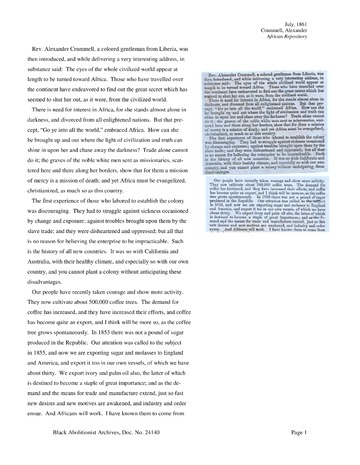
Speaker or author: Crummell, Alexander, 1819-1898
Newspaper or publication: African Repository
Overview of speech regarding the benefits of living in Liberia. The speaker painted a picture of a booming civilization with natural abundance and potential for economy growth and prosperity.
Description of file(s): PDF 3 page, 1,020 word document (text and images)
(page1).jpg.jpg)
Title: Anglo-African - September 3, 1865
Speaker or author: editor
Newspaper or publication: Anglo-African (1863 - 1865)
The writer encourages his readers to not patronize businesses that are openly prejudice towards African Americans.
Description of file(s): one scanned newspaper column
(page1).jpg.jpg)
Title: Colored American - February 23, 1839
Speaker or author: editor
Newspaper or publication: The means of our elevation.
The writer urges his readers to seek to elevate themselves through virtuous living. He emphasizes economy, industry, education, and the pursuit of honorable employment. He suggests to his readers that the best way they can elevate themselves is by living an honest, moral and ethical life.
Description of file(s): one scanned, two columned, newspaper page
(page1).jpg.jpg)
Title: Colored American - June 17, 1837
Speaker or author: editor
Newspaper or publication: Colored American (1837 - 1842)
The writer expresses his view that the desire for money is clouding the reason of society and causing unwise choices. He urges a focus on independence, industry, and frugality to counteract what he sees as a struggling economic environment based on greed.
Description of file(s): one scanned, two columned, newspaper page
(page1).jpg.jpg)
Title: Colored American - June 26, 1841
Speaker or author: editor
Newspaper or publication: Colored American (1837 - 1842)
The writer continues his series on the subjects of improvement and the elevation of the race. He gives advice on how to achieve financial security through hard work and a focus on accumulating wealth.
Description of file(s): one scanned, two columned, newspaper page
(page1).jpg.jpg)
Title: Colored American - March 14, 1840
Speaker or author: editor
Newspaper or publication: Colored American (1837 - 1842)
The writer continues his commentary on the pros and cons of immigrating to Trinidad and British Guiana.
Description of file(s): two scanned newspaper pages (three columns)
(page1).jpg.jpg)
Title: Colored American - October 24, 1840
Speaker or author: editor
Newspaper or publication: Colored American (1837 - 1842)
The writer tells encourages his readers to save their money instead of spending it frivolously. He notes that while he's not suggesting a specific plan, institutions exist to help them save their money.
Description of file(s): one scanned newspaper column
(page1).jpg.jpg)
Title: Colored American - September 8, 1838
Speaker or author: editor
Newspaper or publication: Colored American (1837 - 1842)
The writer encourages his readers to pattern their lives on statesmen such as Benjamin Franklin and focus on "industry, prudence, and economy." Doing so will lead them to self-improvement and the elevation of the race overall.
Description of file(s): one scanned, one columned, newspaper page
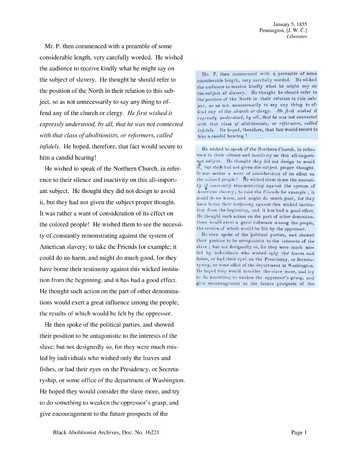
Speaker or author: Pennington, James W. C.
Newspaper or publication: Liberator
Overview of speech stressing the silent compliance of the Church regarding the issue of slavery. He noted that by their lack of action, both Church and politicians have in this way encouraged the continuation of slavery in the U.S.
Description of file(s): PDF 3 page, 780 word document (text and images)
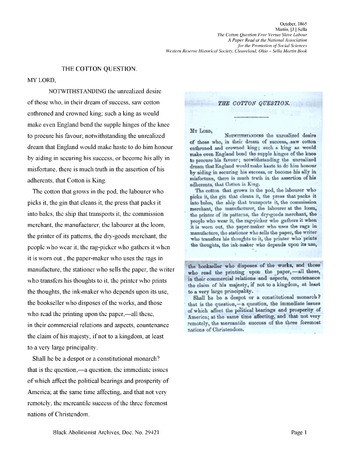
Speaker or author: Martin, J. Sella (John Sella), b. 1832
Newspaper or publication: Western Reserve Historical Society, Cleveland Ohio -- Sella Martin Book
The speaker traced in detail the benefits and the drawbacks of raising cotton. He stressed the value of the crop itself and its positive influence on the American economy. He linked this with the work of slaves who had given their health and lives to produce it. The remainder of the speech stressed the predicament that the emancipation of the slaves placed on those involved with cotton production. He also emphasized that the Negro was not inferior to the white race and he offered several examples to prove this. He believed the future of the production of cotton and other crops was with science not with "brute" man power. The idea of inferiority of one race was not a sound argument for slavery. He argued for the right of all human beings to be free.
Description of file(s): PDF 13 page, 3,682 word document (text and images)
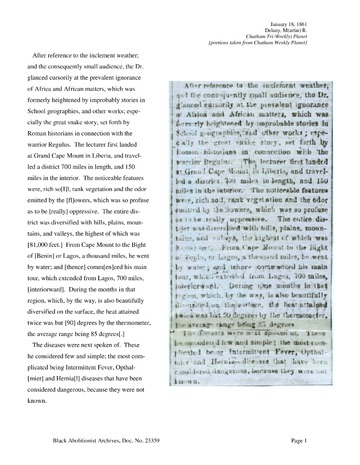
Speaker or author: Delany, Martin Robison, 1812-1885
Newspaper or publication: Chatham Tri-Weekly Planet (with portions taken from the Chatham Weekly Planet)
The speaker gave an account of his recent explorations in Liberia including geological and geographical information. He also stressed the kindness, curiosity and willingness to learn of the people he encountered in Africa.
Description of file(s): PDF 3 page, 630 word document (text and images)
(page1).jpg.jpg)
Speaker or author: editor
Newspaper or publication: Pacific Appeal (1862 - 188?)
The writer tells his readers that all eyes in the civilized world are watching the conflict taking place in the U.S. right now. The problems in Europe have settled down as they watch the changes in this country. The only question that concerns the world now is regarding what the future holds for African Americans.
Description of file(s): one scanned, two columned, newspaper page
(page1).jpg.jpg)
Title: Voice of the Fugitive - January 15, 1852
Speaker or author: editor
Newspaper or publication: Voice of the Fugitive (1851 - 1852)
The writer responds to recent statistics regarding trade between Canada and the U.S. Purchasing goods from the U.S. not only encourages the continuation of slavery, but opens the possibility of the American annexation of Canada.
Description of file(s): one scanned newspaper column
(page1).jpg.jpg)
Title: Voice of the Fugitive - June 3, 1852
Speaker or author: editor
Newspaper or publication: Voice of the Fugitive (1851 - 1852)
Brief description of the positive economic relationship between Michigan and Canada.
Description of file(s): one scanned newspaper column
(page1).jpg.jpg)
Title: Voice of the Fugitive - November 4, 1852
Speaker or author: editor
Newspaper or publication: Voice of the Fugitive (1851 - 1852)
The writer provides a brief overview of the economic and social conditions in the city of Windsor.
Description of file(s): one scanned newspaper column
([page1).jpg.jpg)
Title: Weekly Anglo-African - April 7, 1860
Speaker or author: editor
Newspaper or publication: Weekly Anglo-African (1859 - 1862)
The writer comments on a published account of the array of statistics on how the North is profiting on Southern wealth. Thomas Prentice Kettel had recently published a book on the vast wealth produced in the southern states that the parasitic North, with its dependence on raw materials, benefitted from. The book argues that the result of this concentration of manufacturing in the north is sectional inequality. The North was dominating communications, transportation, finance, and international trade, while the South was growing weaker and poorer.
Description of file(s): one scanned newspaper column
(page1).jpg.jpg)
Title: Weekly Anglo-African - July 30, 1859
Speaker or author: editor
Newspaper or publication: Weekly Anglo-African (1859 - 1862)
The writer comments on an article published in a New Orleans newspaper praising the African American community in New Orleans. He compares the reporting of newspaper editors in New Orleans with that of editors in New York and finds the northern editors lacking honesty and integrity.
Description of file(s): one scanned newspaper column
(page1).jpg.jpg)
Title: Weekly Anglo-African - June 23, 1860
Speaker or author: editor
Newspaper or publication: Weekly Anglo-African (1859 - 1862)
The writer describes various ships that he believes are still participating in the slave trade. Although this practice is illegal, as long as there is money to be made, this will continue. He believes that if the transport of Africans to the U.S. for the purpose of slavery is officially declared piracy by the U.S. government, the laws will be better enforced, and the slave trade will end.
Description of file(s): two scanned, two columned, newspaper pages
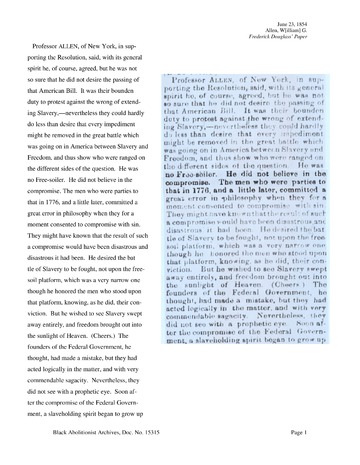
Speaker or author: Allen, William G., fl. 1849-1853
Newspaper or publication: Frederick Douglass' Paper
Speech offering examples of the cruelty and injustice the speaker had experienced and heard of resulting from racial prejudice. The speaker said he agreed with the resolution that slavery was a "sin and crime against God."
Description of file(s): PDF 6 page, 1,372 word document (text and images)



